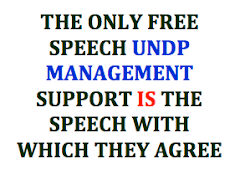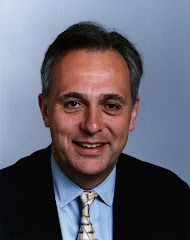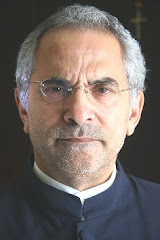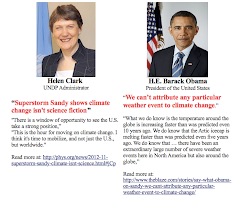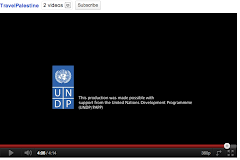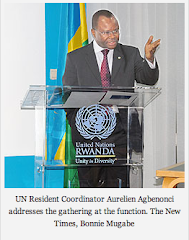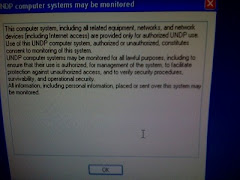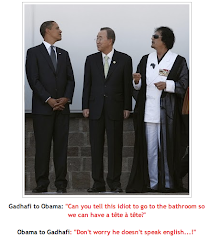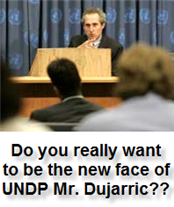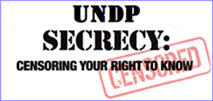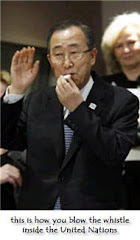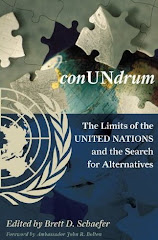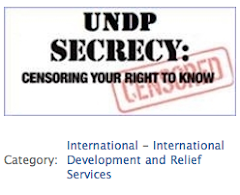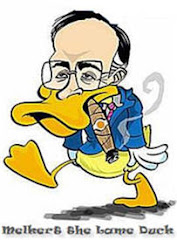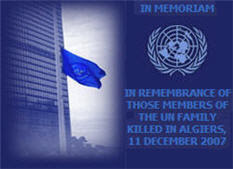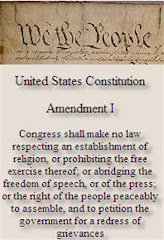by Nile Gardiner
The U.N.-appointed Independent Inquiry Commit tee into the United Nations Oil-for-Food Programme (IIC) released its first Interim Report[1] on February 3, 2005, and its Second Interim Report[2] on March 29, 2005. U.N. Secretary-General Kofi Annan set up the commit tee in April 2004, following calls for a Security Council– backed inquiry into the Oil-for-Food scandal.[3]
The U.N. response to the interim reports has been breathtaking in its arrogance.[4] Notably absent has been any sign of humility, contrition, or accountabil ity on the part of the Secretary-General and his senior aides. Indeed, it is hard to avoid the conclusion that the leadership of the United Nations is still in denial with regard to the U.N.’s declining credibility.

Cartoon by Cox and Forkum
Within hours of its release, the Second Interim Report was greeted with cries of “exoneration” from Annan and his staff, after IIC Chairman Paul Volcker controversially found “no evidence that the selec tion of Cotecna in 1998 was subject to any affirma tive or improper influence of the Secretary-General in the bidding or selection process.”[5] When asked if he was planning to resign anytime soon, Annan dismissively responded, “Hell no!”[6]
A closer reading of both interim reports reveals serious leadership failures at the United Nations. The reports dramatically add to the growing pic ture of mismanagement, incompetence, and unac countability at the U.N. Contrary to Annan’s claims, the reports do not in any way vindicate him or the United Nations. Indeed, the destruction of thousands of critically important documents by the U.N. chief of staff and previously undisclosed meetings between Kofi Annan and Cotecna execu tives make a mockery of U.N. claims of vindication.
The U.S. Congress should respond to the reports by calling for a series of measures aimed at increas ing accountability and transparency at the United Nations and expanding the level of external over sight of the U.N. Congress should also launch a major investigation into the actions of former U.N. Chief of Staff Iqbal Riza and threaten to withhold U.S. assessed funding for the United Nations unless it fully cooperates with congressional investigations into the Oil-for-Food scandal. In addition, Con gress should increase the pressure on Kofi Annan to resign from his position as Secretary-General.
The Volcker Committee
The three-member Independent Inquiry Commit tee is chaired by former Federal Reserve Chairman Paul Volcker. The other two committee members are South African Justice Richard Goldstone and Swiss Professor of Criminal Law Mark Pieth. The commit tee’s 75-member staff, which includes three support personnel on loan from the U.N., operate on a $30 million budget drawn from the U.N. Oil-for-Food escrow account. The Volcker investigation is one of several major investigations into the U.N.’s manage ment of the Oil-for-Food Program. Investigations are being conducted by committees in the U.S. Senate and House of Representatives, as well as by the U.S. Department of Justice, Department of the Treasury, and Government Accountability Office.
The first Interim Report examined the initial 1996 procurement of the three U.N. contractors responsi ble for critical components of the Oil-for-Food Pro gram: inspection of oil exports (Saybolt Eastern Hemisphere BV), inspection of humanitarian goods imports (Lloyd’s Register Inspection Ltd.), and administration of the escrow account for the pro ceeds and payments within the program (Banque National de Paris). It also addressed allegations made against Benon Sevan, the executive director of the Office of the Iraq Program (OIP). The Second Interim Report examined the U.N.’s 1998 hiring of the Swiss company Cotecna Inspection S.A. to inspect humanitarian goods entering Iraq under the Oil-for-Food Program and the potential conflict of interest involving U.N. Secretary-General Kofi Annan, whose son Kojo was employed by Cotecna.[7]
Emerging Issues of Concern for Congress
The interim reports raise a number of important issues that should be of major interest and concern to congressional investigators.
Issue #1: Document Shredding by Annan’s Chief of Staff
The most significant finding in the Second Interim Report is that Iqbal Riza, Kofi Annan’s chief of staff, authorized the shredding of thousands of U.N. documents between April and December 2004. Among these documents were the entire U.N. Chef de Cabinet chronological files for 1997, 1998, and 1999—many of which related to the Oil-for-Food Program.
Riza approved this destruction just 10 days after he had personally written to the heads of nine U.N.-related agencies that administered the Oil-for-Food Program in Northern Iraq, requesting that they “take all necessary steps to collect, preserve and secure all files, records and documents…relat ing to the Oil-for-Food Programme.”[8] The destruc tion continued for more than seven months after the Secretary-General’s June 1, 2004, order to U.N. staff members “not to destroy or remove any docu ments related to the Oil-for-Food programme that are in their possession or under their control, and to not instruct or allow anyone else to destroy or remove such documents.”[9]
Significantly, Kofi Annan announced the retire ment of Mr. Riza on January 15, 2005—the same day that Riza notified the Volcker Committee that he had destroyed the documents.[10] Riza was immedi ately replaced by Mark Malloch Brown, Administra tor of the U.N. Development Programme.
Riza was chief of staff from 1997 to 2004, almost the entire period of the Oil-for-Food Program’s operation, and undoubtedly possesses intricate knowledge of the U.N.’s management of it. He was a long-time colleague of Kofi Annan and served as Annan’s deputy in the Department of Peacekeeping Operations from 1993 to 1996.
The U.N. document destruction scandal raises a number of serious questions:
Under whose instruction did Iqbal Riza autho rize the destruction of U.N. documents?
To what extent was Kofi Annan himself aware of the shredding of the documents?
What role did Riza play in the U.N.’s manage ment of the Oil-for-Food Program?
How closely did Riza work with Benon Sevan, head of the Office of the Iraq Program, during his time as chief of staff?
Issue #2: Kofi Annan and His Dealings with Cotecna
The Second Interim Report gives the overall impression that the relationship between Kofi Annan and Cotecna officials was closer than previ ously known. Itstates that Kofi Annan met twice with Elie Massey, the owner of Cotecna, before the U.N. awarded it the Iraq inspection contract. Their first meeting was in February 1997 at the World Economic Forum in Davos, Switzerland, and the second was in September 1998, arranged by his son Kojo. Significantly, when Kofi Annan was first interviewed by the Volcker Committee in Novem ber 2004, he denied meeting with Mr. Massey before the awarding of the Cotecna contract. He retracted that statement when he was re-interviewed in January 2005, after “a review of the com puter of the Secretary-General’s assistant, (where) the Committee found information reflecting that the Secretary-General had met with Elie Massey on two occasions prior to the award of the inspection contract to Cotecna.”[11] In addition, Annan met with Elie Massey once in Geneva in 1999, after Cotecna was awarded the U.N. contract.[12]
Kofi Annan’s meetings with Cotecna executives should be subjected to congressional scrutiny, as they raise major conflict-of-interest issues. Further more, Annan’s initial unwillingness to disclose these meetings to the Independent Inquiry Com mittee clearly indicates that Mr. Annan has not been acting in a completely transparent manner regarding the Oil-for-Food investigation. Annan should have publicly disclosed this information far earlier, but it was publicly revealed only after an investigation by the Financial Times and Italy’s Il Sole 24 Ore.
The relationship between Kofi Annan and Michael Wilson, Cotecna’s vice president for mar keting operations in Africa, is also of interest. The Volcker investigation reveals that the Secretary-General was “a long-standing friend of Mr. Wilson’s father, who had been Ghana’s ambassador to Swit zerland.” The report states:
Mr. Wilson also knows the Secretary-General well and, in the Ghanaian tradition, considers him like an “uncle.” Shortly after Kojo Annan graduated from university, the Secretary-General and Mr. Wilson spoke about the possibility of Kojo Annan working at Cotecna.[13]
Aside from his contacts with Michael Wilson and Elie Massey, the Volcker Committee also notes:
[Kofi Annan] already was familiar with Cotecna and its prior interest in doing business with the United Nations. In 1991, while he served as the United Nations Controller and Assistant Secretary-General for Programme Planning, Budget and Finance, he had been involved in negotiations with Iraq about initial proposals for an Oil-for-Food arrangement, and Cotecna had written to him, at that time, about its interests in the inspection services contract. He had passed the information on to the United Nations Development Programme (UNDP), the department then in charge of the Iraq Programme.[14]
Issue #3: Kofi Annan’s Internal Inquiry into Kojo Annan and Cotecna
The Second Interim Report is highly critical of the U.N.’s own inquiry into the conflict of interest aris ing from Cotecna’s employment of Kojo Annan and his father’s position as Secretary-General. By all accounts, the U.N. inquiry was a farce, lasting for just one day. The inquiry was prompted by an arti cle published in The Sunday Telegraph on January 24, 1999, which revealed that the U.N. had awarded a major contract to a company (Cotecna) that employed the son of the Secretary-Gen eral.[15]At the same time, the Volcker Committee reports that, “Cotecna was embroiled in a criminal investigation involving allegations that it had made illegal payments for the benefit of former Pakistani Prime Minister Benazir Bhutto.”[16]
The U.N. inquiry was headed by Joseph Connor, Under-Secretary for Management, “who failed to take any action beyond the one-day inquiry that was conducted concerning the truth of the allega tions and their ongoing impact on the fitness of Cotecna to remain as a United Nations contrac tor.”[17] The report asserts that the inquiry was “inadequate” and that the Secretary-General should have referred the matter to the U.N. Office of Inter nal Oversight Services or the Office of Legal Affairs. The report concludes that “had there been such an investigation of these allegations, it is unlikely that Cotecna would have been awarded renewals of its contract with the United Nations.”[18] At the same time, the report states that “Kojo Annan actively participated in efforts by Cotecna to conceal the continuing relationship with him.”[19]
While the Volcker Committee shies away from drawing the conclusion, the Secretary-General’s failure to order a comprehensive, independent inquiry into this matter, given his own conflict of interest, clearly demonstrates at the very least a huge management failure and possibly a deliberate attempt by Annan to avoid a thorough investiga tion of serious charges.
Issue #4: Benon Sevan’s Role
Benon Sevan, a Cypriot, served as Under Secre tary-General and executive director of the U.N. Office of the Iraq Program from 1997 to 2004. A career U.N. employee since 1965, Benon Sevan has served in numerous U.N. positions, including Assistant Secretary-General and deputy head of the Department of Political Affairs. He has been the subject of intense scrutiny since being named in the report of U.S. weapons inspector Charles Duelfer, which alleges that he received a voucher for 13 mil lion barrels of oil from Saddam Hussein.
The IIC conducted an intensive investigation of Sevan’s conduct as OIP director, “a position of immense power and transnational responsibil ity.”[20] His job placed him in a position of constant communication with the Saddam Hussein regime and numerous U.N. member states, including all of the Security Council members. Sevan “supervised or coordinated the activities of hundreds of inter national staff in New York and overseas, including a considerably larger number of citizens of Iraq.”[21]
The report’s findings into Sevan’s conduct while head of the OIP are damning. The Committee con cluded that:
[Sevan] solicited and received on behalf of AMEP (African Middle East Petroleum Co Ltd Inc) several million barrels of allocations of oil from 1998 to 2001. As a result of Mr. Sevan’s conduct, AMEP’s revenue—net bank fees and surcharge payment—totaled approximately $1.5 million.
The IIC declared that Sevan’s actions “presented a grave and continuing conflict of interest, were eth ically improper, and seriously undermined the integrity of the United Nations.”[22]
The seriousness of the charges leveled against Sevan in the first Interim Report clearly merit crim inal prosecution, and the U.N.’s pledge to lift diplo matic immunity for Mr. Sevan is an important first step in the right direction.
Mr. Sevan should also be interviewed by con gressional investigators to shed more light on his illicit activities, as well as any criminal activity by members of his staff. Besides facing justice, Sevan could serve as a vitally important source of infor mation regarding attempts by the Saddam Hussein regime to influence decision-making at the U.N. and in the Security Council. Several key questions need to be answered:
How did Sevan manage to blatantly flout U.N. rules without raising any suspicions?
Why was there no oversight of Sevan’s man agement of the Office of the Iraq Program?
To what extent was Kofi Annan aware of cor rupt practices within the OIP?
Were other U.N. staff assisting Sevan with his illicit activities?
How extensive were the ties between Sevan and the Saddam Hussein regime?
How was Sevan picked to become OIP director?
Were allegations of corruption leveled against Sevan when he served in previous U.N. posi tions?
Issue #5: Boutros Boutros-Ghali, Banque Nationale de Paris, and the U.N. Escrow Account
The U.N. decision to appoint the French com pany Banque Nationale de Paris (BNP) to adminis ter the Oil-for-Food escrow account is the subject of intense scrutiny in the first Interim Report. Vast sums of money were handled through the escrow account. The Saddam Hussein regime sold more than $64.2 billion of oil under the Oil-for-Food Program between 1996 and 2003.[23] BNP was selected by then U.N. Secretary-General Boutros Boutros-Ghali, even though the decision did not conform to the requirement under U.N. financial rules to accept the “lowest acceptable bidder.”[24]
The report demonstrates that several banks were better placed to manage the Iraq escrow account on the basis of their higher credit quality (based on standard ratings by IBCA Limited of London): Union Bank of Switzerland, Deutsche Bank, Credit Suisse, Citibank, and Chase Manhattan.[25] The U.N. Treasury eventually opted for Credit Suisse as its first choice to run the escrow account, but BNP was awarded the contract.
Boutros-Ghali’s decision to select BNP over more qualified competitors should be the subject of con gressional scrutiny. The following questions need to be answered:
How much influence did Saddam Hussein wield over Boutros-Ghali’s final decision?
To what extent did the U.N. give the Iraqi regime a veto over the choice of a bank for the U.N. escrow account?
How close was the relationship between Boutros-Ghali and the Saddam Hussein regime?
What role did the French government play in the U.N. decision to opt for BNP?
What was the nature of the relationship between BNP and the Iraqi government, both before it won the escrow account and during the period when it administered the account?
Issue #6: The Secretive U.N. Iraq Steering Committee
The first Interim Report sheds some light on the powerful Iraq Steering Committee, created by Boutros-Ghali “to ensure the timely and effective implementation” of the Oil-for-Food Program and designed to report to the Secretary-General “on a regular basis.” It operated in a highly secretive manner and “did not keep official records or min utes of proceedings and determinations.” Signifi cantly, the U.N. archives are “devoid of records of the Steering Committee.”[26]
The Steering Committee was chaired by Chin maya Gharekhan, Under Secretary-General and Senior Adviser to the Secretary-General, and included five other high-level U.N. officials: Yakushi Akashi, Under Secretary-General for Humanitarian Affairs; Joseph E. Connor (an American), Under-Secretary-General for Administration and Manage ment; Hans Corell, Under Secretary-General for Legal Affairs; Marrack I. Goulding, Under Secretary-General for Political Affairs; and Yukio Takasu, Assis tant Secretary-General and Controller.[27]
There is a strong case to be made for members of the Iraq Steering Committee to testify before Con gress and to assist congressional investigators. The report leaves the impression that the Steering Com mittee was a powerful policy group surrounding the Secretary-General, operating without account ability or transparency and completely avoiding any form of scrutiny.
The Steering Committee is a symbol of the cul ture of secrecy and unaccountability that pervaded the U.N.’s handling of the Oil-for-Food Program. It is in the public interest that Congress investigate the operations of the Steering Committee.
Key Omissions from the Volcker Interim Reports
While the interim reports raise a number of important issues, there are some glaring omissions.
The Management Role of Kofi Annan. While the Volcker Committee went to considerable lengths to explore the relationship between Kofi Annan, Kojo Annan, and Cotecna, it makes very little attempt to assess Annan’s role as the official responsible for over all management of the Oil-for-Food Program. The IIC also fails to examine the role played by Iqbal Riza, Annan’s chief of staff, in running the Oil-for-Food Program—a striking omission considering that Mr. Riza shredded thousands of U.N. documents, many of which were related to the Oil-for-Food Program.
Given that Mr. Annan handpicked Benon Sevan to head the Oil-for-Food Program, it is also extremely surprising that the report fails to explore the background to Mr. Sevan’s appointment and his working relationship with the Secretary-General. Nor does the report at any time consider what the Secretary-General might have known about the program’s failings at various stages of its existence.
The Lack of U.N. Oversight of the Office of the Iraq Program. The first Interim Report makes no serious effort to explain why the Office of the Iraq Program did not receive significant scrutiny from the Office of Internal Oversight Services. It also makes no attempt to question why Secretary-General Annan did not keep an eye on the New York headquarters of the U.N.’s biggest humanitar ian operation. The strong friendship between Mr. Sevan and Mr. Annan must surely warrant investi gation as a possible factor behind this lack of over sight. Clearly, Annan either was asleep at the wheel and grossly negligent or deliberately ignored wide spread mismanagement and corruption.
The role of the U.N. Secretariat should also be questioned. After all, the report clearly states that “although the Security Council and its 661 Com mittee exercised combined supervisory and opera tional oversight of the Programme, the Secretariat of the United Nations administered its day-to-day operation.”[28] The IIC sheds no light whatsoever on the Secretariat’s involvement in overseeing the OIP.
Attempts by Saddam Hussein to Influence Security Council Members. The detailed allega tions made by Chief U.N. Weapons Inspector Charles Duelfer regarding Iraqi attempts to influ ence members of the Security Council to lift U.N. sanctions receive scant attention in the interim reports. The close ties between Russian and French politicians and the Iraqi regime and the huge French and Russian financial interests in pre-liber ation Iraq were almost certainly an important factor in influencing their governments to oppose Hus sein’s removal from power.
The Oil-for-Food Program and its elaborate sys tem of kickbacks and bribery was a major source of revenue for many European politicians and busi ness concerns, especially in Moscow. Congressional hearings on the financial, political, and military links between Moscow, Paris, and Baghdad should shed light on the tempestuous Security Council debates that preceded the war with Iraq and on the motives of key Security Council members in opposing regime change in Baghdad.
What Congress Should Do
Congress should respond to the interim reports by calling for a series of measures aimed at increas ing accountability and transparency at the United Nations in the wake of the Oil-for Food scandal, as well as ensuring effective oversight of future U.N. operations. Specifically, Congress should:
Increase pressure on Kofi Annan to resign.[29] From the massive failure of manage ment and leadership, it is increasingly clear that Kofi Annan is unfit for office. He has been surrounded by a constellation of corruption at the heart of the U.N. system, and it is incon ceivable that he was unaware of the pervasive problems afflicting the Oil-for-Food Program. As U.N. Secretary-General, Annan must be held accountable for the biggest scandal in U.N. history, as well as for a wave of other major scandals across the U.N. system, includ ing widespread abuses by U.N. peacekeepers in the Congo. Annan should step down in favor of an interim Secretary-General, specifi cally tasked with cleaning house, eliminating corruption, and implementing immediate institutional reform of the U.N. The interim Secretary-General should be someone of great stature and integrity. If Annan remains in power and completes his term of office, his successor will inherit a tarnished position, in effect a poisoned well.
Launch a major investigation into Iqbal Riza and the shredding of U.N. documents. The destruction of highly sensitive documents by Kofi Annan’s chief of staff is an obstruction of justice that demands congressional investiga tion. It gives the impression of a major cover-up at the very heart of the United Nations and casts a dark cloud over the Secretary-General’s credibility. It projects an image of impunity, arrogance, and unaccountability on the part of the leadership of the United Nations. Riza— who, like Benon Sevan, is retained on the U.N. payroll at an annual salary of $1—should be made available to congressional investigators and should explain his actions before Con gress. If it appears Riza is responsible for crim inal actions, his diplomatic immunity should be lifted to pave the way for prosecution.
Call for the U.N. to establish an independent archive facility to store U.N. docu ments. In light of the Riza shredding scandal, Congress should call for the U.N. to establish an independent archive facility to house copies of all major U.N. documents. The facility should be located on a separate site from the U.N. headquarters. Copies of significant U.N. documents and correspondence (for example, Chef de Cabinet and Secretariat files) should be deposited within a set period from time of production. Such a facility should be funded by cutting wasteful U.N. programs.
Call for the creation of an external body to oversee U.N. operations. The U.N. Office of Internal Oversight Services lacks the tools, expertise, public confidence, and above all, the independence to conduct effective, transpar ent, and impartial investigations into allega tions of large-scale fraud and mismanagement within the United Nations. An external over sight body completely independent of the U.N. bureaucracy and staffed with non-U.N. offi cials (but backed by a Security Council man date) should be established to oversee major U.N. operations, including humanitarian pro grams and peacekeeping operations.
Call for the establishment of a U.S. over sight unit to monitor how American contri butions are spent by the U.N. The United States should set up its own U.N. oversight unit, answerable to Congress, specifically charged with monitoring the use of American contributions to U.N. peacekeeping and humanitarian operations. This should be funded by diverting part of the annual U.S. assessed contribution for the United Nations and could be located in the U.S. Mission to the United Nations.
Withhold U.S. assessed funding for the United Nations unless the U.N. fully cooper ates with congressional investigations into the Oil-For-Food scandal. The United States has been the United Nations’ biggest contribu tor since it was founded in 1945. In 2004, the U.S. contributed $360 million toward the U.N.’s routine operating expenses—22 percent of the U.N.’s regular annual operating budget and more than the combined contributions of France, Germany, China, Canada, and Russia. Congressional leaders should make it clear that Congress will withhold all of the U.S. assessed contribution until the United Nations has pro vided unlimited access to relevant documenta tion on the Oil-for-Food Program and the sworn testimony of U.N. officials. The withheld funds should be placed in an escrow account, with future disbursement contingent on satis factory resolution of these matters.
Insist that future inquiries into U.N. scan dals be fully independent. In the future, the Secretary-General should not be allowed to pick the investigation committee into a U.N. scandal and then pass it off as “independent.” Such inquiries will always be open to the possibility of political interference and manipula tion by those being investigated. Congress should insist that future investigations into U.N. scandals be completely independent of the Secretary-General. Chairmen of such inquiries should also be asked to disclose, upon appointment, all potential conflicts of interest, whether business or political.
Invite Pierre Mouselli to testify before Con gress. Congressional investigators should exam ine the claims made by Pierre Mouselli, a French former business partner of Kojo Annan, who alleges that the Volcker Committee downgraded and ignored evidence damaging to Kofi Annan, which he provided. In addition, Mr. Mouselli should be invited to testify before Congress. Congress should also ask the Volcker Committee to clarify its refusal to take into account this evi dence. The Volcker investigation should be spe cifically asked if it has deliberately ignored critical evidence that could implicate the Secre tary-General.[30]
Insist that Paul Volcker present his final find ings to the Iraqi government. On conclusion of his investigation, Mr. Volcker should present his findings not only to the U.N. Secretary-General, but also to the people of Iraq, repre sented by the Iraqi government. Through no choice of their own, the Iraqi people are cur rently footing the bill for the Volcker investiga tion with money taken by the U.N. from the Oil-for-Food escrow account. If the Iraqi gov ernment is not satisfied with the investigation’s thoroughness, Congress should support Iraqi efforts to recover the $30 million cost of the Volcker investigation. If the U.N. refuses to reimburse the Iraqi people, Congress should withhold the exact amount from the U.S.-assessed contribution for the U.N. and divert the funds to the Iraqi treasury. It is only right that the United Nations—not the Iraqi victims of U.N. fraud, mismanagement, and corrup tion—bear the cost of a U.N.-appointed inves tigation into allegations of wrongdoing by U.N. officials.
Conclusion
It is highly disturbing that Kofi Annan has sought to downplay many of the damning findings contained in the Independent Inquiry Committee reports. In his press conference after the release of the Second Interim Report, Annan stated that “after so many distressing and untrue allegations have been made against me, this exoneration by the independent inquiry comes as a great relief.”[31]
The U.N.’s senior leadership has apparently not learned any lessons from the Oil-for-Food scandal. The elite ruling clique that surrounds Mr. Annan at the top of the United Nations continues to behave with impunity while projecting an air of superiority deeply resented by many rank-and-file U.N. employees. It is no coincidence that staff morale at the United Nations has hit an all-time low.
Increasingly, Mr. Annan appears to be using Paul Volcker as a shield to protect his own dwindling reputation. It is hard not to conclude that a more critical and neutral chairman would have drawn far harder-hitting conclusions from the mountain of damaging evidence. Despite his investigators pre senting an ugly tableau of incompetence, misman agement, corruption, and deception at the top of the United Nations, Mr. Volcker has shied away from significant, direct criticism of the Secretary-General and the United Nations as an institution.
In stark contrast to Mr. Volcker’s silence, the two other IIC members have openly criticized Annan’s claims of “exoneration.” Professor Pieth stated, “We did not exonerate Kofi Annan. We should not brush this off. A certain mea culpa would have been appropriate.”[32] Similarly, Judge Goldstone refuted the notion that the report cleared Annan of wrongdoing, describing Annan’s failure to apolo gize as “an opportunity lost.”[33]
Despite Mr. Volcker’s unwillingness to sharply criticize the Secretary-General, there is little doubt that Kofi Annan’s position at the helm of the United Nations is becoming increasingly untenable. The IIC reports give the overriding impression of an institution that is fundamentally broken and in dire need of major reform and new leadership. In addi tion, over the coming months, several congres sional inquiries into the U.N.’s management of the Oil-for-Food Program will release their findings, which could prove hugely damaging to Annan’s reputation. By no means is the Volcker investiga tion either the final or the definitive inquiry into the matter.
In order to begin restoring the credibility of the United Nations, Mr. Annan should step down. By remaining in office despite growing evidence of widespread U.N. failings, Annan sends a message of impunity, arrogance, and unaccountability on the part of the U.N. leadership. He is also setting a poor precedent for future U.N. leaders, who will be encouraged to believe they will not be held accountable for the organization’s failures. Annan is increasingly a “lame duck” Secretary-General who has become a severe liability to the U.N.’s credibility. Serious reform will be impossible as long as he remains in power.
The author is grateful to James Dean, Deputy Director, Foreign and Defense Policy, in the Government Relations Department at The Heritage Foundation, for his advice and suggestions. Heritage Foundation intern Nicole Collins assisted with research for this paper.
 DEN HAAG - De SP is het niet eens met de oplossing van het conflict met oud-minister Eveline Herfkens. SP-Tweede Kamerlid Ewout Irrgang had liever gezien dat minister Maxime Verhagen (Buitenlandse Zaken) haar voor de rechter had gesleept. „Ze komt nu weg zonder juridische procedure.”
DEN HAAG - De SP is het niet eens met de oplossing van het conflict met oud-minister Eveline Herfkens. SP-Tweede Kamerlid Ewout Irrgang had liever gezien dat minister Maxime Verhagen (Buitenlandse Zaken) haar voor de rechter had gesleept. „Ze komt nu weg zonder juridische procedure.”















